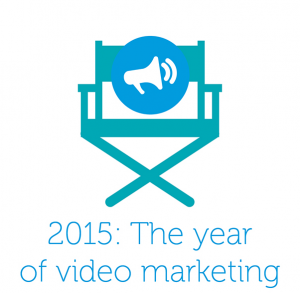With the cost of video production reducing, video is taking content marketing by storm with the demand for online videos outpacing the budgets required. According to Cisco, they predict globally in 2019, consumer internet video traffic will be 80% of all consumer internet traffic, up from 64% in 2014 (Cisco, 2015). This shows the huge potential this can provide organisations, but will this trend result in online video being the main focus for agencies in content marketing strategies? And should the marketing agencies be adopting these strategies for themselves? And how should videos be approached?
Will online video be the main focus for agencies in content marketing strategies?
The growth of video online is staggering, they are making it into every interaction we’re making online with the likes of live video feeds on Twitter with Meerkat and other methods on Facebook and Instagram (Spiceworks, 2016). According to Forbes (2015), more than 80% of senior executives watch more video than they did a year ago, and three quarters of executives are watching work-related videos every week, and given the choice, 59% of executives would rather watch a video than read an article. This shows that video will become essential in content marketing strategies, as video is perfect for reaching and informing potential and current clients.
Videos increase open rates and click-through rates, resulting in an increased brand awareness with video ads having an average click-through rate (CTR) of 1.84%, the highest click-through rate of all digital ad formats (Hoelzel, 2014). This shows that companies will be looking at video for their own campaigns, with agencies having to make sure they have the capabilities to respond to these requests, especially as Hoelzel (2014) suggests, video ad revenue will increase at a three-year compound annual growth rate (CAGR) of 19.5% through 2016. Video marketing is so popular HighQ named 2015 the year of video marketing with 78% of people watching videos online every week, and 55% of people watching videos online every day (HighQ, 2015), showing the importance of video in content marketing. With these statistics, and HighQ stating video marketing is on the rise, client requests to agencies could be very much focused around video. For example, an email campaign having a link to a video created. This trend is only set to continue as Cisco suggest with consumer internet traffic on the rise.
To read more, click here to see an infographic from HighQ on 2015: The year of video marketing
Should marketing agencies be adopting these strategies for themselves?
With so many marketing agencies, it is essential to get your name out there. Online video would be a successful way for agencies to spread-the-word of their brand and increase their client base. When it comes to potential reach, video is unrivalled. YouTube has over a billion users with hundreds of millions of hours of YouTube videos generating billions of views, with the number of hours people spend watching videos on YouTube increasing by 60% y/y (YouTube, 2016), this is the fastest growth they have seen in 2 years, showing how online video is increasing in popularity, and marketing agencies need to take this into consideration.
With the increased hours of videos watched, and as suggested above, more senior executives are watching more video than they did before, as these are a main target audience for agencies in achieving clients, video looks a favourable method to reach these consumers.
People hire an agency to solve problems, and the skills and knowledge of the agency can be demonstrated in online videos. If they can prove they are experts in their field-of-work, clients will trust the agency to solve the problem for them, increasing the client base, and fundamentally, revenue.
So, how should online videos be approached?
Before the video is produced, the target audience must be identified, as Baines, et al, (2010) suggests, all segments must be distinct, accessible, measurable and profitable. The audience the video is intended for must be relevant, with the video being easy to digest, because if not, consumers will move on. According to Kolowich (2012), online videos need to be segmented into three tiers:
- Showpiece videos – the splashy pieces that grace the front door of the website
- Workhorse videos – these explain your most important product/service offering
- Long-tail videos – provide prospects with a much deeper understanding of products/services offered, as well as to answer frequently asked questions
These three types of videos can be used in different content marketing campaigns, depending on the budget available. Agencies can use long-tail videos to answer the questions frequently asked in their area of expertise, to show they have the knowledge to be a worthy agency choice.
Social media must be embraced and not neglected as it needs to be promoted across multiple channels. If you want to fully realise video’s potential, you must make it easy for users to find and share it (Trimble, 2015). Mobile must not be neglected as online video in 2014 accounted for 50% of all mobile traffic (Merchant Marketing Group, 2014), proving to be a huge part of how video is consumed.
Videos must be creative, not only with the video, but the content marketing strategy adopted. Audiences want to be entertained, and to do this, creativity is vital in getting the public’s attention. For a marketing agency producing a video, putting the personality that drives the business at the centre, people will become excited about your business (Jefferson, 2015), increasing leads.
So, the answer to the question ‘For marketing agencies, is online video the future focus of their content marketing strategies?’ is YES!!!!
Want to read more, you may find the following of interest…
Why online video is the future of content marketing
3 ways small businesses can use video marketing
References
Baines, P., Fill, C., and Page, K. (2010) Marketing. Oxford: Oxford University Press. Print.
Cisco, (2015) Cisco Visual Networking Index: Forecast and Methodology, 2014-2019 White Paper. Available at: http://www.cisco.com/c/en/us/solutions/collateral/service-provider/ip-ngn-ip-next-generation-network/white_paper_c11-481360.html [Accessed: 30 Jan 2016].
Forbes, (2015) Forbes Insights. Available at: images.forbes.com/forbesinsights/StudyPDFs/Video_in_the_CSuite.pdf [Accessed: 30 Jan 2016].
HighQ, (2015) 2015: The year of video marketing. Available at: https://highq.com/2015-year-of-video-marketing/ [Accessed: 30 Jan 2016].
Hoelzel, M. (2016) Online Video Advertising Is Growing Many Times Faster Than TV, Search, And Most Other Digital Ad Markets. Techinsider.com. Available at: http://www.techinsider.io/digital-video-advertising-growth-trends-2014-5 [Accessed: 30 Jan 2016].
Jefferson, B. (2015) 3 ways small businesses can use video marketing. mashable.com. Available at: http://mashable.com/2015/04/02/video-marketing-small-business/#AdA9w7Uuvuqt [Accessed: 30 Jan 2016)
Kolowich, M. (2012) 3 simple strategies to tame your video content budget. contentmarketinginstitute.com. Available at: http://contentmarketinginstitute.com/2012/01/reduce-your-video-content-budget/ [Accessed: 30 Jan 2016)
Merchant Marketing Group, (2014). Merchant’s 2015 Digital Marketing Predictions. merchantmarketinggroup.com. Available at: http://merchantmarketinggroup.com/news/merchants-2015-digital-marketing-predictions/ [Accessed: 30 Jan 2016].
Spiceworks, (2016) The Rise of Video Marketing. Spiceworks.com. Available at: http://www.spiceworks.com/marketing/rise-video-marketing/ [Accessed: 30 Jan 2016].
Trimble, C. (2015) Why online video is the future of content marketing. theguardian.com. Available at: http://www.theguardian.com/small-business-network/2014/jan/14/video-content-marketing-media-online [Accessed: 30 Jan 2016].
YouTube, (2016) Statistics. Youtube.com. Available at: https://www.youtube.com/yt/press/en-GB/statistics.html [Accessed: 30 Jan 2016].


